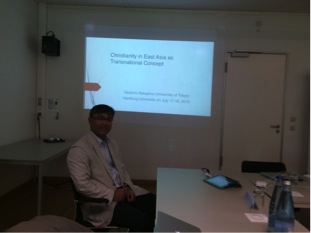[Report] “Conceptual and Intellectual History: Recent Trends in East Asian Studies”
There was a workshop “Conceptual and Intellectual History: Recent Trends in East Asian Studies” at Asien-Afrika-Institut, Hamburg University on July 17–18, 2015.
The agenda of this workshop is as follows:
The fields of conceptual and intellectual history, long dominated by methodological nationalism, have undergone significant changes in recent years. European scholars of conceptual history have broadened their view to take into account the transnational and ‘entangled’ history of concepts as well as problems of translation. In intellectual history, and notably in research on the history of political thought, but also in comparative political theory, similar tendencies of taking a transnational, ‘globalized’ perspective can be observed in Europe and America. In all of these fields, recent studies have replaced the narrative of a single – Western – origin of concepts, ideas and theories that spread as universals with more nuanced discussions of regional adaptations and contestations within a framework of multiple modernities. In this process, Europe is becoming “provincialized,” and other, especially East Asian perspectives have gained prominence. This shift of perspective has gained momentum due to Chinese, Japanese and Korean scholars who have enhanced research agendas by introducing a number of new topics and concerns, and, last but not least have recently embarked on large-scale research projects concerning East Asian concepts modeled, in turn, on Western paradigms.
The workshop aims to engage German scholars of political science, conceptual history, and philosophy and Chinese, Japanese as well as Korean scholars of conceptual history in a discussion of theoretical and methodological issues of their common field.
Nakajima Takahiro gave a talk “Christianity in East Asia as Transnational Concept.“ It will be published in Oriens Extremus in 2016.







